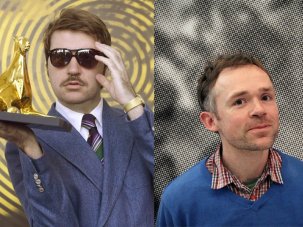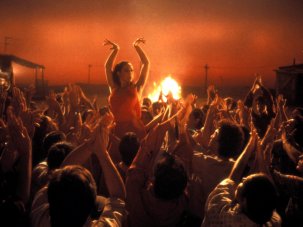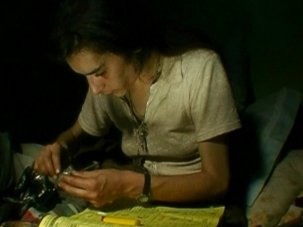Web exclusive
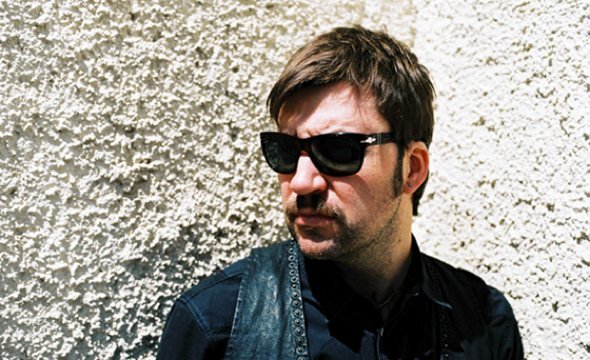
Albert Serra
It’s always a pleasure to welcome Albert Serra, self-proclaimed “greatest director in Spain”, back to the London Film Festival. I cherish the memory of seeing his stunning debut feature Honour of the Knights, a mesmerisingly aslant concentration and distillation of the Don Quixote novel and myth, here in 2006: it’s still one of my all-time favourite LFF screenings.
I caught his new film The Lord Worked Wonders In Me (his third film after 2008’s Birdsong) on an unseasonably warm Saturday afternoon at the ICA. The audience was sparse, but among the dedicated few were directors Yorgos Lanthimos and Ben Rivers, both big fans of Serra’s work. (You can read Rivers’ thoughts on the film here.)
The Lord Worked Wonders In Me, weighing in at 146 minutes, is paired with a much shorter film by Lisandro Alonso, Untitled (Letter for Serra). Together they’re part of a series of filmed ‘letter’ exchanges between directors commissioned by the Barcelona Contemporary Culture Museum (CCCB), which was inaugurated by Víctor Erice and Abbas Kiaorastami in 2006 and continued by José Luis Guerín and Jonas Mekas in Correspondence, also shown in this year’s LFF.
I met Serra to discuss the ‘Letters’ project and his own contribution (Alonso didn’t make it over to London this year). In conversations prior to shooting, the pair (long-term friends) agreed to make just one film each rather than a back and forth of ‘letters’, and as a point of contact between their new films, to refer to their own earlier works and push deeper into their respective aesthetics. Hence the return in Alonso’s film of a character from his 2001 debut La Libertad, Misael the woodcutter.
The Lord Worked Wonders in Me takes place in La Mancha, setting for Cervantes’ Don Quixote, the original idea being to shoot a road movie in that novel’s mythical imaginary landscape. What Serra and his actors and collaborators discovered was that that landscape no longer exists, if it ever did. “There were no interesting or beautiful things,” Serra told me, forlornly.
Instead they started filming in interiors – the cheap hotels they were staying in, or inside the van they used to get around – as well as in different landscapes. The idea morphed into something more self-referential, complementary to the aforementioned Honour of the Knights rather than related to the ‘real’ Don Quixote: a making-of for a film that doesn’t exist, or in fact is the film you’re actually watching – or as Serra puts it below, a making-of for all his previous and future films. Serra and co invite the viewer on a long, fascinating, sometimes arduous journey, one blessed with some exquisite moments and ultimately worth making the time for.
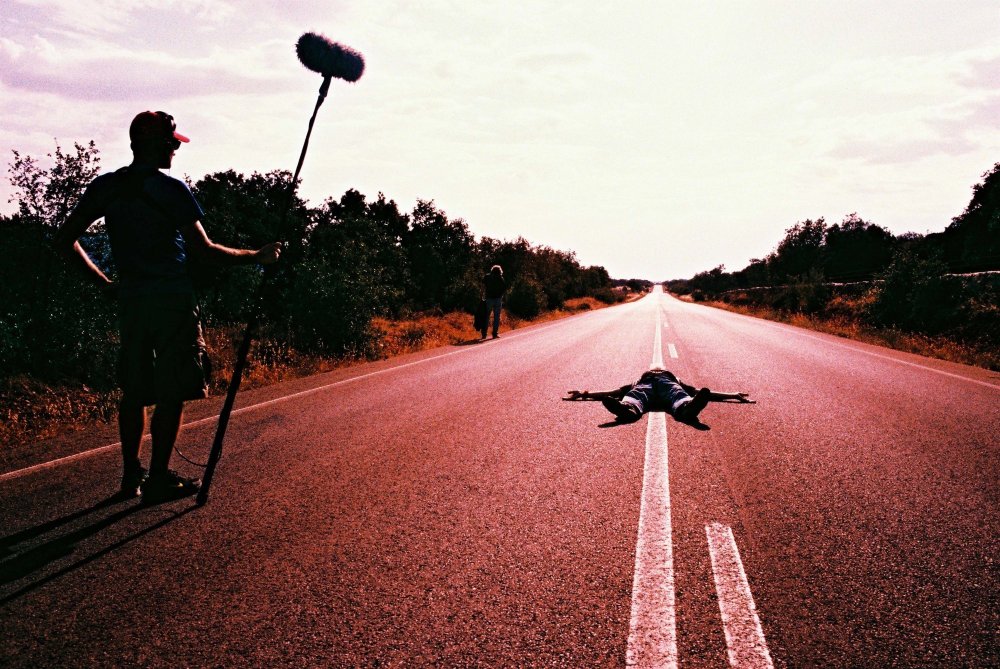
The Lord Worked Wonders in Me
Alonso and Serra is a fairly obvious pairing to anyone familiar with the landscape of contemporary filmmaking of a more radical bent. The pair tend to be grouped with the Portuguese director Miguel Gomes, partly because they’re of the same generation – all born in the same year, according to Serra – and partly because they came to prominence around the same time, under the auspices of Olivier Père’s Quinzaine (Director’s Fortnight) programming in Cannes.
In truth, they’re all quite different aesthetically, with Serra most clearly positioned in the vanguard of a particular long-take observational cinema. What they have in common is more on the level of attitude and stance; a willingness to take big risks, an affinity for working with non-professionals, sometimes in the farthest reaches or most overlooked areas of their respective countries, and a proclivity for mashing up documentary and fiction to novel and exciting effect.
The interview below is my first encounter with Serra, already something of a legend of the contemporary filmmaking scene. I found him funny, engaging, provocative, opinionated, uncompromising. To his detractors he’s a loud-mouthed charlatan, to others a showman and much-needed wind-up merchant; there’s certainly no-one else quite like him in contemporary cinema. I’ve presented his thoughts verbatim; they emerged as an unstoppable torrent, but I’ve tried to structure them into more easily assimilable chunks.
On getting the commission
“It was a dream. They give you some money and say ‘do whatever you want’.”
On the ‘Correspondence’ project
“The idea was it should be like the others in the series (Kiaorastami/Erice, Guerin/Mekas). You send one letter, the other answers, and so on. But Lisandro and I are friends; none of the others knew each other before. We did, so it wasn’t about communication in our case, it was more about aesthetic affinity, and friendship. So we just decided to go deeper into our own aesthetics, and make our work in as honest a way as possible.
“It seemed childish to make small pieces; I wasn’t interested in what Lisandro was doing now. In the other couples, they are fake friends; they are trying to make this masquerade of communicating something, a masquerade of friendship.
“The idea for me was to make a free film, and the commissioners said ‘Okay, just do what you want; it will be one letter.’ I originally sent Lisandro a three-and-a-half-hour first cut, without subtitles, and he said, ‘Fuck, this is not a letter, it’s a monologue!’”
On his own filmed ‘letter’, The Lord Worked Wonders In Me
“In my case it was having the possibility to show the things I hadn’t been able to before in my films, because of aesthetic pressure or because they were deemed improper. The ludic side of the way I work is hidden in my previous films because of their formalism, but it’s an important element for me: it’s why I decided to make cinema, for fun, to make a break with routine daily life, which is getting more mediocre all the time. Cinema was a way of escaping this. Cinema is a social art that creates a certain ambience; it’s work but there’s also the element of friendship and family.
“But I also wanted to bear witness to something in this film – to a way of making films that is perhaps disappearing, because cinema is not financing this kind of approach, these kind of festival films, any more. Showing long works is important nowadays. I’m tired of stupid little things. I like to make something long, that requires time. I like to feel time, duration. Cinema should be this, making perception of time and space more intense. Daily life can’t allow this intensity of perception, of beauty. Cinema can make this happen, and for me this is essential.”
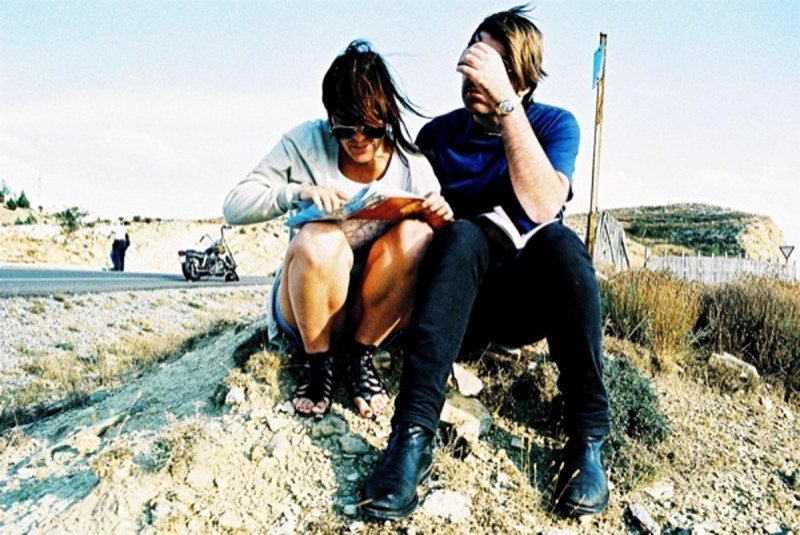
The Lord Worked Wonders in Me
On how this film differs from his other films
“When you edit a feature film, you always ask yourself, ‘Will this work?’, and when you ask that you’re not thinking just of yourself but of the global concept of the film. You’re not thinking of the audience, exactly, but whether the film will be better or worse.
“In this film my idea was to avoid this and follow my own taste. It’s a joke ‘making of’ of all my previous features, and my future ones too, I hope. You never see a camera. You never know who is controlling the point of view; sometimes you have the sense that there’s no-one behind the camera, that it stands alone. You realise after a while that the film being shot is in fact the film you are seeing.”
On cinema
“In my case I don’t have a grand idea of cinema; for me it’s just another art form. I don’t have this dream of living inside cinema. I feel closer to 20th century art, even if I am a cinephile. I don’t feel the romantic idea of cinema. I don’t like cameras, I don’t l like shooting, I don’t like technical things. For me, far more than a game, cinema was a subversive way to change my life. But it could equally have been another thing.”
On using digital cameras
“My actors are always non-professionals, and they simply require more time. I don’t have money, and I like to shoot long shots. But even if I had money, I wouldn’t shoot on film. It’s impossible with my actors. It would be boring; it would be like working.”
On technical craft
“I never operate the camera, I detest it. Whenever I’m on the street and see someone shooting something, I hate it. Sometimes I look through the camera and check the composition, but only 5 or 10 per cent of the shots, when the cinematographer has some doubts.”
On working exclusively with non-professionals
“There are two main reasons. Working with non-professionals, I’m always discovering things, so working becomes more entertaining. With my idea of making films for fun, and this subversive idea of changing our lives, it’s more interesting, and the only possibility.
“Secondly, there’s something else that I discovered slowly when I was working, which is becoming a powerful idea in my mind: between you and the non-professional actor, you are alone. The manipulation by the director of the actor is direct. But with professional actors they have an imaginary in between you and them. In other words they have some model in their minds about how to act, or how someone did it before, or some techniques, visual or physical, they can use.
“I don’t like that, it’s as if you are writing a book and you are two… I don’t like books written by two. It can sometimes create complexity, but only in a few films; perhaps when it’s conscious and you play with that, like in Almodóvar’s films, perhaps it can be interesting. But I don’t want to work when I make cinema, I don’t want to have to study the imaginary just to make this actor work. Why deal with this, why spend days trying to solve this problem when with a non-professional actor it’s already solved? It’s losing time, it’s wasting energy.
“And I don’t like actors. As personal human beings, I don’t like the character of actors in general. Polanski said, ‘An intelligent actor is a paradox’. Acting is nothing, and they pay you. American actors get millions of dollars for doing nothing.”
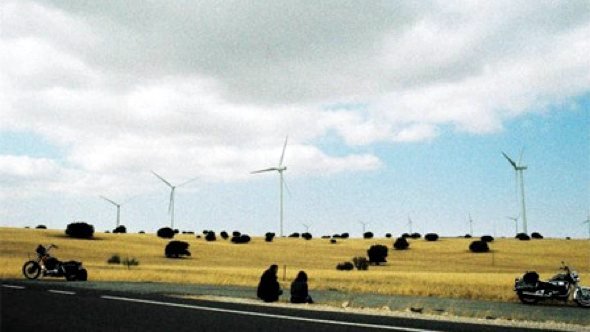
The Lord Worked Wonders in Me
On improvisation
“My films are improvised, there is no script. I always use non-professional actors I know, more or less, so I intuit how they will react. I put them in situations where I ask them to say or do something so I can more or less predict how it will develop. There is a beautiful quote of Picasso’s: ‘I don’t look for things, I find them.’ I know more or less what will happen. But they always surprise me too, and that’s what is beautiful: this manipulation of the actors goes in two directions.”
On his new film, Dracula
“It’s 90 per cent finished. It’s my biggest budget to date, €1.2 million. It’s not only Dracula, because I don’t like fantastic cinema, so I’ve mixed Dracula with Casanova. It’s a challenge; the line between sublime and ridiculous can be really really fine in this case. It’s risky, the film can fail, because it tries to mix different levels, different themes.
“And this is something you see to in filmmakers I admire, such as Miguel Gomes and Lisandro Alonso: the possibility of failure has to be real because otherwise it won’t be alive. Dracula and Casanova is a risk because they don’t match, so we have to solve that problem. Every film has to be a challenge and a new direction.”
On admiration for, and influence by, other filmmakers
“I like Sokurov, always, even if he makes bad films or failed films, because he takes risks. And you can’t spot any influences there – perhaps Tarkovsky, a very far-off echo. I like some Béla Tarr films, even if they are too emphatic for my tastes. I like some of Hong Sang-Soo’s film, even though he’s far from my style and interests. They’re so simple and yet so complex, a beautiful portrait of the people of the world nowadays.
“But they don’t influence my work. I try to be as particular and as alone as possible. It makes no sense to be influenced by others. Be influenced by music, by writers, but not by cinema. I find it vulgar to be influenced by filmmakers. Compared to a writer, nowadays a filmmaker is more like an actor. You have to keep these serious roots. Like Buñuel, who was coming from surreal art: he was not a filmmaker but something else; part of the world, part of the art world, part of the thinking of the time.
“I try to be, but today it’s more difficult, everybody is more isolated. It has to be ambitious in some sense, in the past sense that has been forgotten. It has to be honest. I never go to the cinema. I don’t like Tarantino, for example; he’s very bad. Maybe Death Proof. Sokurov was very angry with Marco Muller when he made Tarantino president of the jury in Venice: how can you put this idiot as president of the jury? For Sokurov, art and cinema are sacred, and I am closer to this idea.”
On artists
“I’m a man of the past, but it’s something I don’t like. I don’t like this nostalgia, this melancholia. I don’t like cinema in a romantic way, but I like the romantic idea of the artist in general. Artists are different to other people. In my mind, only artists can see beauty; for that reason they are different.
“Spectators can have the intuition that in the film there is beauty, but they really cannot see the beauty. Only other artists and filmmakers can really see this pure beauty. And for me the artist is sacred, because they can perceive beauty directly. This romantic idea is very important. It makes no sense to me to avoid this for the sake of being more successful or more popular.”
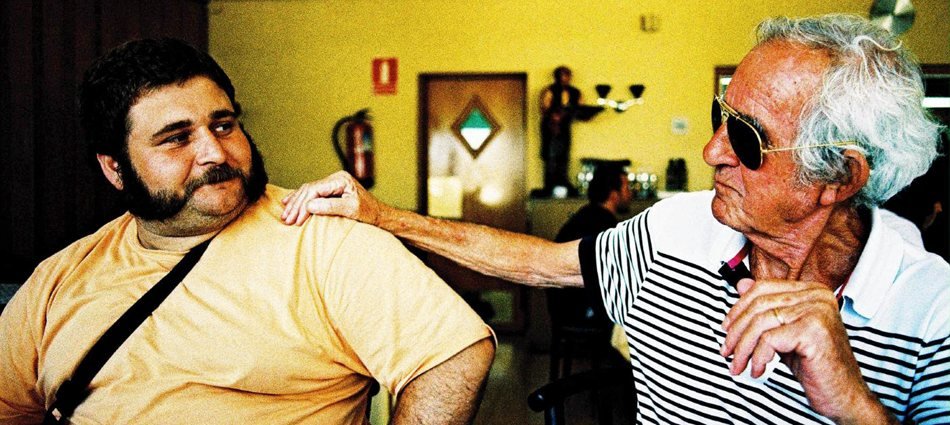
The Lord Worked Wonders in Me
On Lisandro Alonso
“I don’t know if he is this kind of artist, but I like his work. Los Muertos is my favourite film. I don’t like Liverpool; it’s becoming bad. But the main reason Los Muertos is so good is because the main actor is so charismatic. It’s simple. Why don’t other people do that? Take this man. The man is so charismatic, the intensity is growing, growing, through all the stages of the film, even the psychological and dramatic aspects are growing due to the charisma of the actor. For me it was very impressive. La Libertad is too repetitive and formalist for me.
On British cinema
“I hate all British cinema. There are no British filmmakers I like, none at all. I hate Michael Powell, especially Peeping Tom; it’s one of the most horrible films I’ve ever seen. Derek Jarman is very bad, but there are some small, crazy things in there I like. The worst is McQueen: he is the devil, an absolute devil, because he is making people believe he is making artistic films, and it’s bullshit. But film criticism, film taste here in the UK, it’s not really respectable. It’s like being in a province. It’s a small cinema for me.
“Nowadays the only city where you get proper distribution in cinemas and where they show most of the films from Cannes is Paris. I don’t like France, or French people, and I’ll never live there, but in cinema terms it’s the only capital that’s not provincial. London is provincial, it’s terrible. Last time I was at the festival the audiences were very bad. People didn’t understand the film; they thought it was a joke.”
On Spanish cinema
“I am the best one. I hate Erice. Those are films for children. And I don’t like films with children in them, like Spirit of the Beehive. Saura has a few good films, Bardem too; Berlanga is more folkloric. There are a few in the past. Buñuel is the greatest figure; for me this is the true spirit. All the others are just filmmakers.”
On American cinema
“I like American cinema of the past, but it’s the same problem as with independent cinema today: I hate it all.”
On cinema’s future
“The space for cinema is shrinking. This is what I am now dealing with, but I don’t know what I’ll do exactly. Perhaps the art world, but I don’t like the art world.”
-
The Digital Edition and Archive quick link
Log in here to your digital edition and archive subscription, take a look at the packages on offer and buy a subscription.




